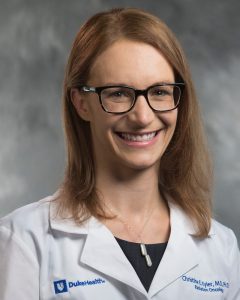Laughter Lightens the Challenge of Writing Exam Questions
By Rodney Campbell, ABR Communications Manager
2024;17(3):12

Writing questions for ABR exams is serious work. But volunteers can still have fun in the process.
Christine Eyler, MD, PhD, a radiation oncologist and member of a committee that develops questions for the Biology and Physics Qualifying Exam, said she and her colleagues find ways to keep the mood light even as they spend hours writing and reviewing questions for candidates.
“I laugh a lot,” she said. “It’s a funnier group than I ever thought there would be writing radiation biology questions. But people are legitimately funny, and it’s been a really warm group.”
Learning to write fair and relevant questions is challenging. New committee members go through a breaking-in process the first several times they try. It’s not something they do in their regular jobs.
“In the first review of questions, it was almost like stage fright in terms of having to explain and defend your questions,” she said. “But I feel more like it’s a collaborative workshop than a spotlight on deficiencies. That’s been really pleasant.”
Dr. Eyler’s question-writing acumen is quickly getting better, but there remain areas where she wants to improve.
“I’m on the wordier side, so writing questions that are clear, to the point, and easy to answer is a skill that I’m still working on,” she said.
Dr. Eyler is the Butler Harris Assistant Professor in Radiation Oncology at the Duke University School of Medicine and a member of the Duke Cancer Institute. She fills several roles, spending four days a week in the lab or teaching and the other day seeing patients at VA Durham Healthcare. Her lab and instruction work allows her to interact with residents who will be taking ABR Initial Certification exams, and her clinical duties provide the opportunity to directly serve patients and see real-life cases.
She believes both experiences give her a well-rounded approach to her ABR volunteer tasks.
“(Working with residents) makes it a little bit easier because I can put myself in the head of someone who doesn’t marinate in some of these more nuanced topics all day every day and say, ‘Is there any sort of patient relevant issue that can be tested here?’” she said. “Since I also see patients, that’s a hat I can easily put on.”
She’s proud to be a scientist and clinician at Duke. She has three technicians, an undergraduate, and a resident researcher helping in her lab, where the work involves genetic and epigenetic consequences of tumor evolution under treatment pressure.
“The initial pretreatment tumor, the tumor after a few weeks of treatment, and the tumor at the end when resistance develops looks quite different,” Dr. Eyler said. “I’m interested in describing that and seeing if there’s any sort of alternative treatment strategies that might capitalize on any Achilles heels that are revealed over that evolution process.”
Duke Health contracts with the Durham VA to provide services, giving Dr. Eyler the chance to see patients with varied conditions.
“If I’m a specialist in anything, it’s GI, but I see little bit of everything,” she said. “I think that my base of clinically relevant material has expanded considerably because I see a little bit of prostate, a little bit of breast, some brain tumors. I see a little bit of everything in addition to my GI focus. I’m constantly reviewing things because that’s a lot of stuff to stay fresh on.”
Dr. Eyler has a simple but effective way to remember cases when it’s time to develop exam questions.
“I have a little set of sticky notes,” she said. “I have sticky notes everywhere.”
Being prepared helps her feel a better kinship with the group, even over video calls. The committee hasn’t met in person since she joined.
Dr. Eyler was recruited to the team by a scientific mentor and former committee member. Despite the challenging work, she and her colleagues have a good time as they work to improve their exam.
“The people on the committee make it fun,” she said. “It says a lot that some of the members have been there for years.”


